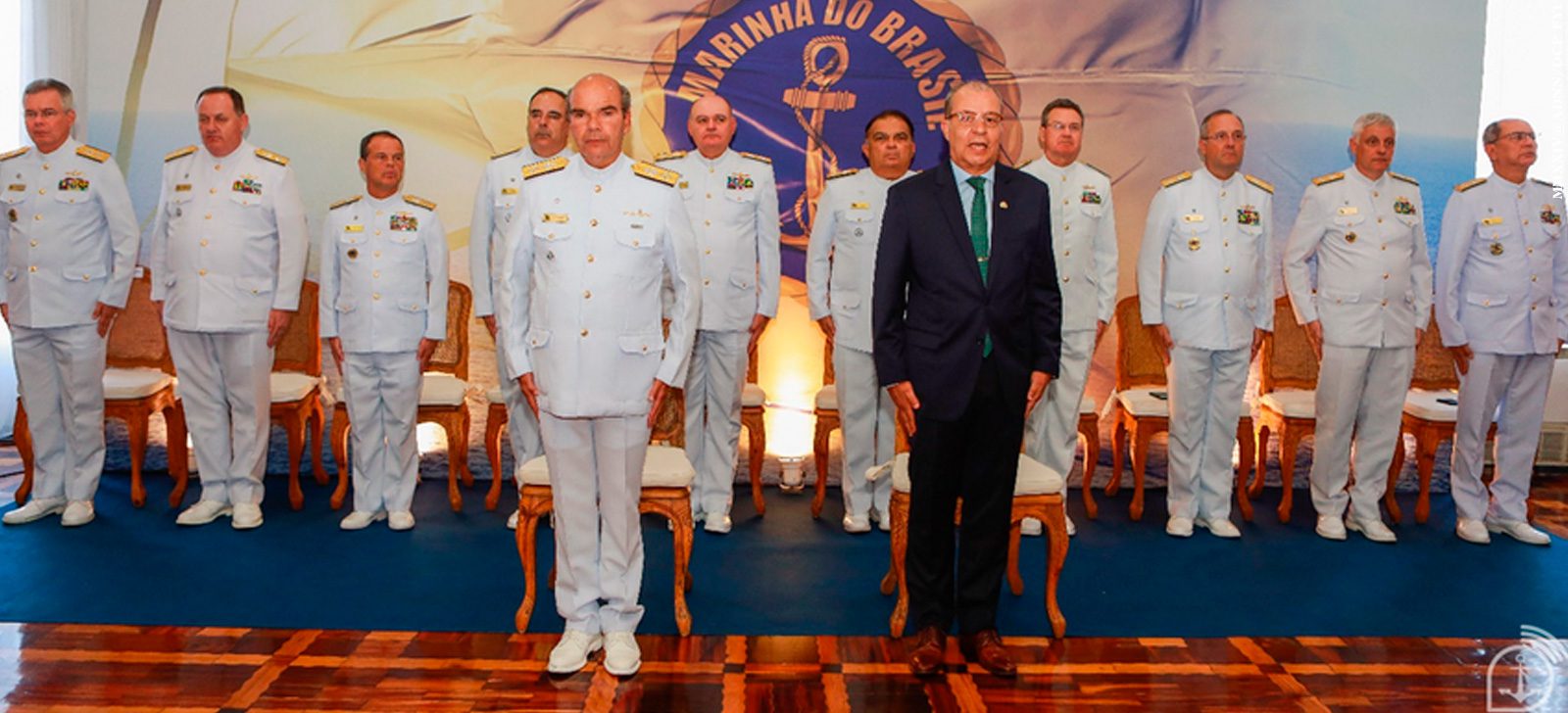Admiral will be in charge of regulating and supervising the use of nuclear energy in maritime and naval activities
By Edwaldo Costa
In a ceremony held on Tuesday (30), in the Great Hall of the Almirante Tamandaré building (EdAT), the Commander of the Navy, Fleet Admiral Marcos Sampaio Olsen, swore in Fleet Admiral (RM1) Petronio Augusto Siqueira de Aguiar as Naval Secretary for Nuclear Safety and Quality. The ceremony was attended by former Ministers of State; former Navy Commanders; members of the Admiralty; Brazil’s Permanent Representative to the International Maritime Organization (IMO); representatives of the Brazilian nuclear sector; the academic, scientific and technological community; industry, as well as other authorities from Brazil and abroad. Fleet Admiral (RM1) Petronio became the first head of the Naval Secretariat for Nuclear Safety and Quality (SecNSNQ), a body that directly assists the Commander of the Navy, whose main tasks are to regulate, license, inspect and control submarines, surface ships, platforms or vessels that use nuclear reactors as their own energy sources or for third parties, especially in Brazilian Jurisdictional Waters, with the aim of protecting crews, the population, property and the environment from the undesirable effects of ionizing radiation.
The Commander of the Navy, in his remarks, mentioned that the strategic decision to obtain and operate a Nuclear Propulsion Submarine, based on the implementation of the Navy’s Nuclear Program, gave rise to a commitment to the safety of the operational use of this means, translated into the complete protection of society and the environment.
In this sense, the Brazilian Navy is seeking to implement a structure compatible with the guidelines proposed by the International Atomic Energy Agency (IAEA) for the design and construction of means, through legal frameworks for regulatory activities, licensing and control of activities and transportation of nuclear fuel for these means. “It is imperative to reaffirm that the creation and improvement of the regulatory body, represented by the Naval Secretariat for Nuclear Safety and Quality, make effective the Navy’s unswerving commitment to the peaceful applications of nuclear energy, as set out in the Constitution of the Federative Republic of Brazil and in various agreements and treaties to which the country is a signatory, in particular the Nuclear Non-Proliferation Treaty and the Quadripartite Agreement,” said Admiral Olsen.
For his part, Admiral Petronio mentioned the urgency of addressing the various aspects related to the safety of nuclear activities with maritime applications. “The tasks imposed on us by the new management posture require us to seek solutions in order to achieve the necessary balance between Nuclear Safety and Maritime Safety,” he said.
For the new Secretary, these areas are distinct, but interconnected, and aim to guarantee the protection and defense of national interests in different contexts. He highlighted “the need to establish security guidelines and protocols that address nuclear and maritime threats, to contribute to the promotion of international agreements and treaties to guarantee nuclear and maritime security, and to promote cooperation between the agencies responsible for these areas”.
Faced with the challenges ahead, Admiral Petronio also stressed the importance of following the Navy Commander’s guidelines and the need for intense cooperation with bodies such as the Ministries of Foreign Affairs and Science, Technology and Innovation; the National Nuclear Energy Commission (CNEN), the Brazilian-Argentine Agency for Accounting and Control of Nuclear Materials (ABACC) and the Brazilian academic and scientific nuclear community.
At the end of his speech, Admiral Petronio expressed his confidence in a successful future in fulfilling the mission of ensuring the nuclear safety of embarked nuclear plants, land-based nuclear support facilities and the maritime transportation of nuclear fuel.
Source: Agência Marinha de Notícias *** Translated by DEFCONPress FYI Team ***
